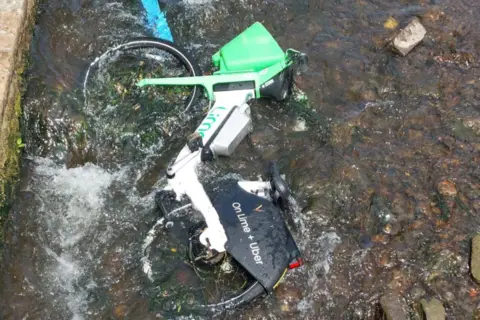In recent months, there has been increasing concern regarding the dumping of Lime e-bikes into rivers and canals across England. This practice poses significant environmental risks, raising alarms over pollution and potential flooding. The Canal and River Trust, an organization responsible for maintaining waterways, has reported a troubling trend, noting that numerous Lime bikes have been retrieved weekly from such locations. Within Nottingham alone, it is estimated that around eight or nine bikes are recovered from the canals each week.
The alarm was raised following the implementation of Lime’s hire schemes, which have become prevalent in various cities. With the introduction of these electric bicycles into urban settings, the ensuing problem of bikes being discarded in waterways has become a national challenge. The Canal and River Trust has expressed its growing frustration, as this issue not only drains their operational resources but also poses a considerable risk to the environment. According to Dick Vincent, a national towpath advisor for the trust, the dumping of one bike can lead to potential damages amounting to thousands of pounds, affecting not just boats but also the canal infrastructure and local wildlife.
As troubling as these statistics may be, the concern extends beyond mere numbers. The Environment Agency has echoed worries regarding the ecological damage caused by submerged e-bikes. Their lithium-ion batteries can leach harmful substances into the water, a situation which may harm aquatic life and impact overall water quality. Alarmingly, the Canal and River Trust estimates that the total number of Lime bikes dumped across the UK could reach into the thousands, making the situation dire.
Despite these ongoing challenges, responses from Lime, the operating company bringing these electric bikes to the streets of Nottingham and other cities, indicate a willingness to collaborate with local authorities to address the problem. However, the trust’s officials have expressed frustration at the lack of concrete actions from the company to mitigate the issue of bike disposal. Lamentably, attempts to reach agreements over the retrieval costs of the bikes have not resulted in fruitful outcomes.
Community initiatives are also emerging in response to this issue. Toni Robinson, the founder of the Little Litter Pickers of Nottingham, has spearheaded efforts to clean the River Leen, where her group has pulled a surprising number of bikes from the water. In her experience, the presence of e-bikes in the river adds a formidable challenge to maintaining its cleanliness, with concerns that these bikes are polluting the water more than traditional litter.
The theft of Lime bikes, often by individuals who exploit their lack of required locking mechanisms, is believed to be a key factor in their frequent disposal. Reports suggest that many stolen bikes are ultimately discarded in rivers rather than being returned for legitimate use. Community leader Ethan Radford, Deputy Leader of Nottingham City Council, has noted that the misuse of bikes tends to occur primarily after their initial rental, as individuals seek to act irresponsibly without the fear of consequences.
As discussions surrounding these issues continue, proposals have emerged advocating for a model similar to that of docking systems, like those utilized by rental schemes such as Santander Cycles, which require users to secure bikes in designated areas. Such an approach could significantly reduce the rates of theft and vandalism, thereby preserving public spaces while safeguarding the environment.
In conclusion, the waterway pollution caused by dumped Lime bikes is a burgeoning crisis requiring immediate action from all stakeholders involved. While the company has committed to recovering misplaced bikes and engaging with local authorities, a more structured and collaborative approach will be essential to tackle the root of the problem. Given the risks involved, both ecological and economic, the collective goal should be to curtail the environmental damage and enhance the sustainability of urban transport initiatives.



